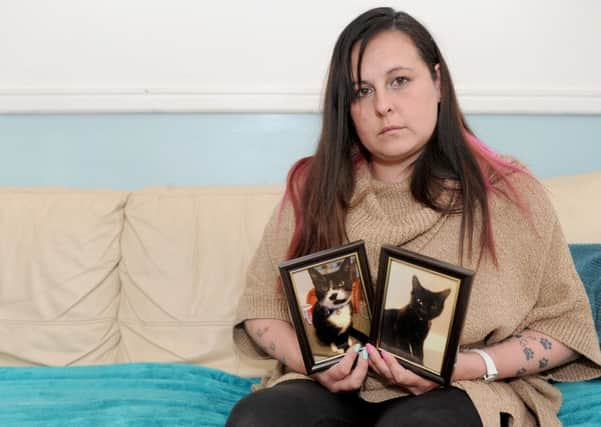Heartache as cats are put down after being poisoned by anti-freeze


The 31-year-old had to put down her two cats Pierre and Worms after they were found with the poisonous liquid in their system.
Sarah said: ‘This was a deliberate attack on my cats, I’m absolutely devastated, I don’t know how somebody could do this to someone else’s pets.’
Advertisement
Hide AdAdvertisement
Hide AdShe said: ‘I noticed that both my cats were showing signs of discomfort, so I took them to the vets where I had to put them both to sleep.’
Sarah, who is an author, said: ‘I don’t want anyone to go through what I have had to go through. I have lost two very special kitties who were loved so much by my family.’
Sarah, from Stamshaw, is warning other pet owners to beware of the symptoms shown by their pets in similar circumstances.
She said: ‘Anti-freeze can be a very painful poison for pets so I want people to be aware of the signs and know what to look out for.’
Advertisement
Hide AdAdvertisement
Hide AdSarah’s cats were treated at the PDSA pet branch in Southsea.
PDSA Vet Rachel Clay said: ‘If you suspect your pet has eaten a toxic substance, you should contact your vet immediately for advice.’
She said: ‘Signs of poisoning are varied and can include severe vomiting, lack of appetite, diarrhoea, increased thirst, poor co-ordination and increased respiratory rate.’
Rachel added: ‘The earlier that treatment is received the better the outcome is likely to be as in serious cases poisoning can be fatal.’
Advertisement
Hide AdAdvertisement
Hide AdShe said: ‘If you suspect the poisoning may be malicious, report this to the RSPCA and the police immediately .’
Laura Quinn, RSPCA spokesperson for Hampshire, said: ‘It is not yet clear whether or not this was a deliberate act. However, deliberately poisoning any animal is a criminal offence and is one that we take very seriously.’
She said: ‘If you are found guilty of committing an offence of this nature you can face a £20,000 fine and up to six months in prison.’
‘We urge anyone who may have any further information about how these cats came to be poisoned to contact our inspectorate appeal line on 0300 123 8018.’